Personal Reflection
VerifiedAdded on 2023/04/07
|7
|1467
|322
AI Summary
This personal reflection explores the values, beliefs, and behaviors that contribute to or detract from cultural safety in a healthcare environment. It discusses the importance of positivity, acceptance, and respect in promoting cultural safety, as well as the negative impact of exercising authority, mistrust, and risk-taking. The reflection emphasizes the need for healthcare practitioners to be aware of their own values and behaviors to ensure safe care delivery.
Contribute Materials
Your contribution can guide someone’s learning journey. Share your
documents today.
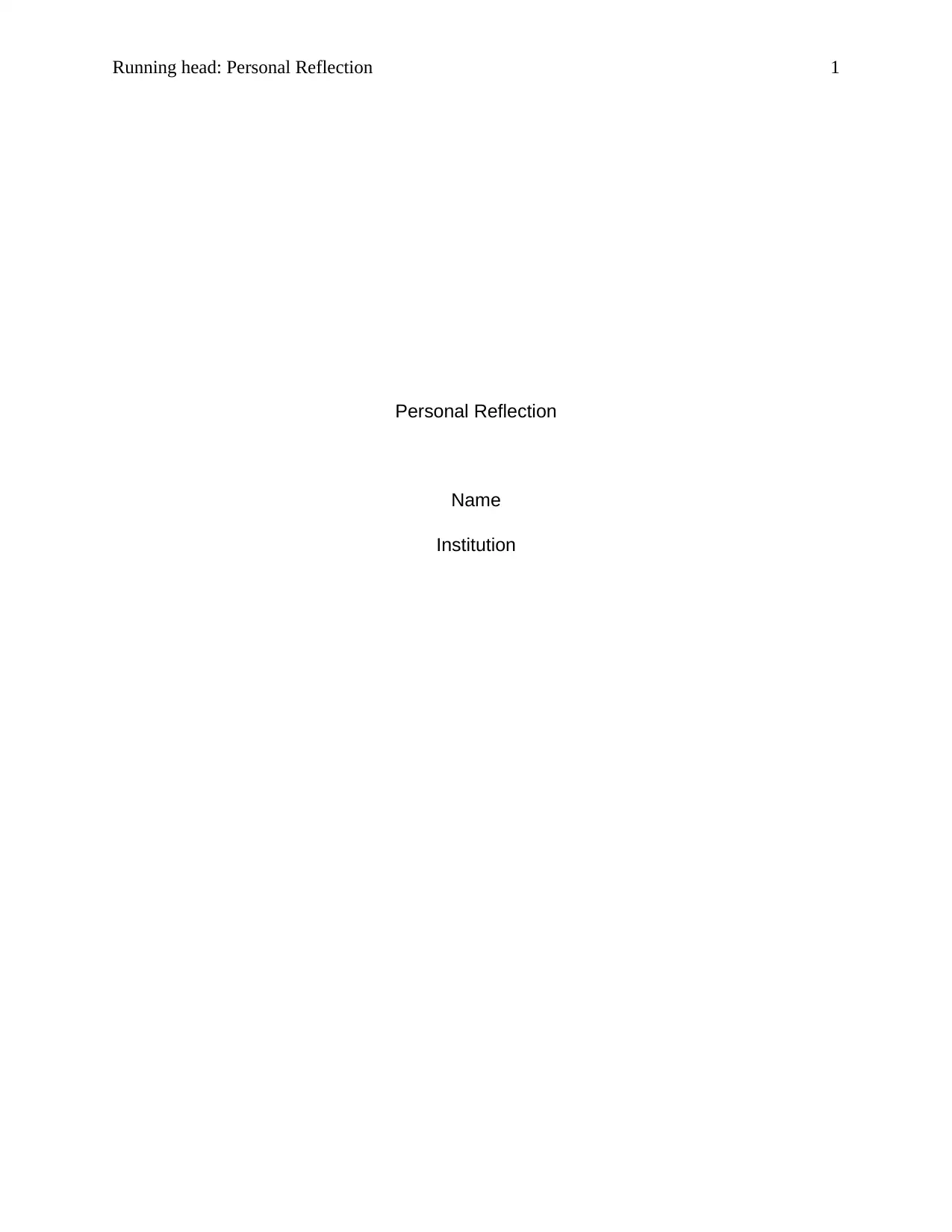
Running head: Personal Reflection 1
Personal Reflection
Name
Institution
Personal Reflection
Name
Institution
Secure Best Marks with AI Grader
Need help grading? Try our AI Grader for instant feedback on your assignments.
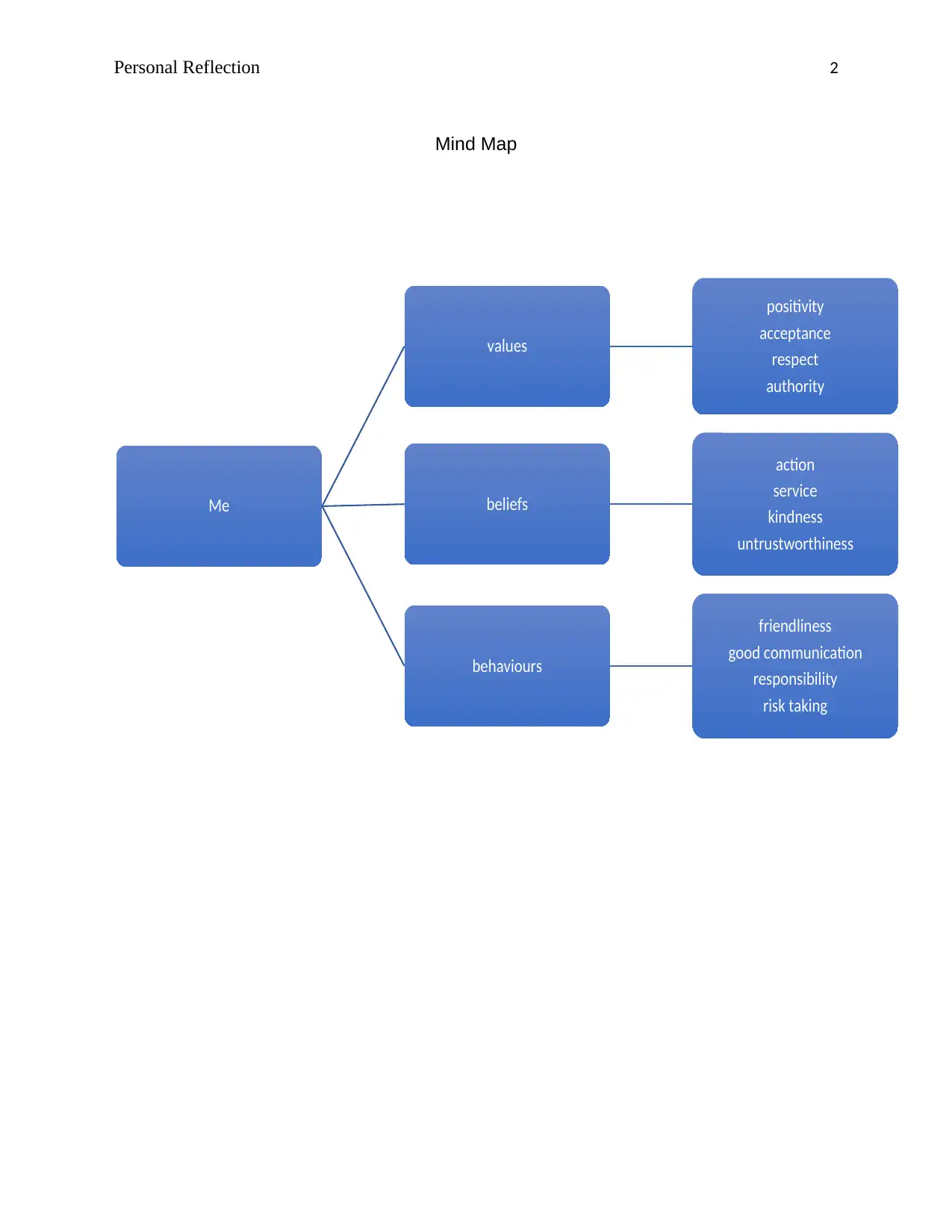
Personal Reflection 2
Mind Map
Me
values
positivity
acceptance
respect
authority
beliefs
action
service
kindness
untrustworthiness
behaviours
friendliness
good communication
responsibility
risk taking
Mind Map
Me
values
positivity
acceptance
respect
authority
beliefs
action
service
kindness
untrustworthiness
behaviours
friendliness
good communication
responsibility
risk taking
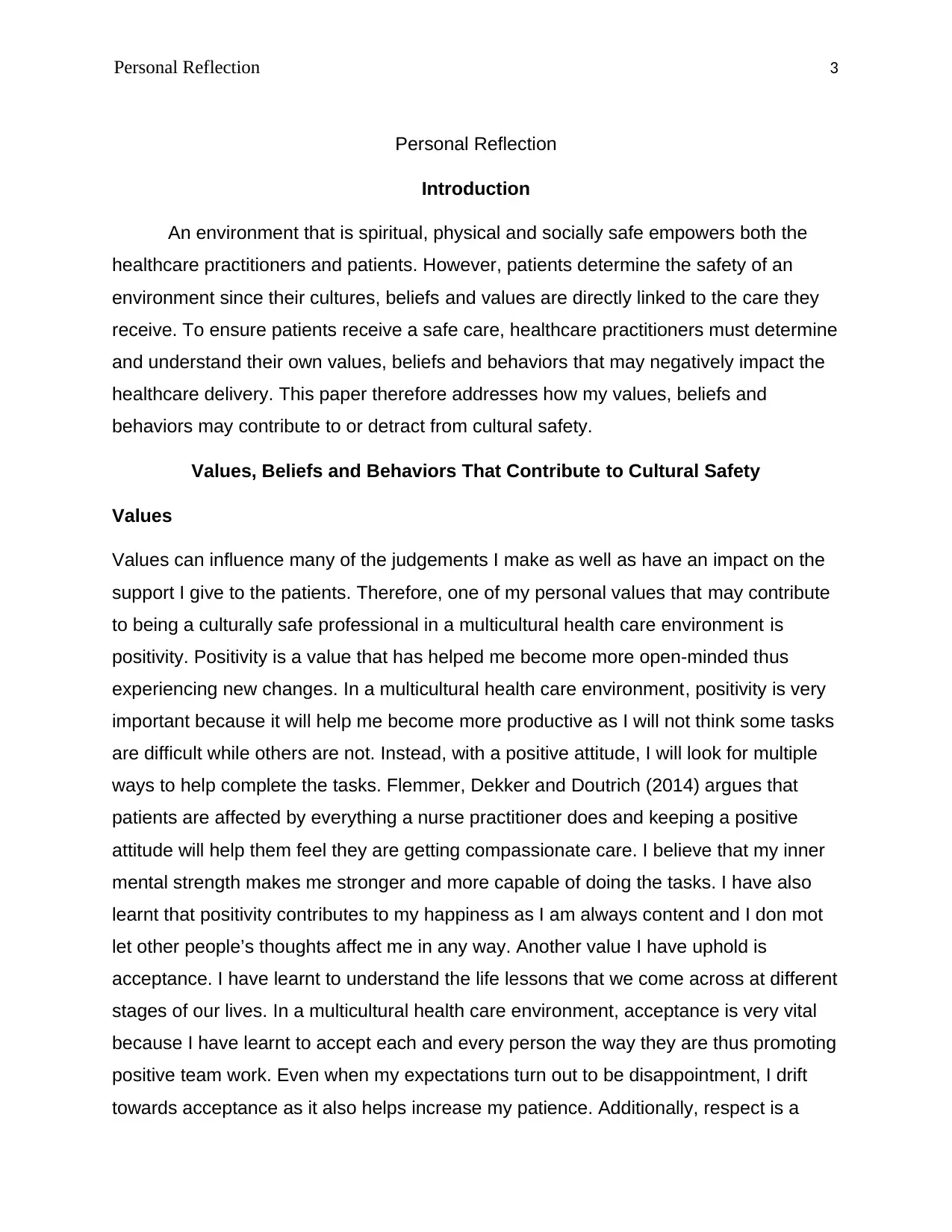
Personal Reflection 3
Personal Reflection
Introduction
An environment that is spiritual, physical and socially safe empowers both the
healthcare practitioners and patients. However, patients determine the safety of an
environment since their cultures, beliefs and values are directly linked to the care they
receive. To ensure patients receive a safe care, healthcare practitioners must determine
and understand their own values, beliefs and behaviors that may negatively impact the
healthcare delivery. This paper therefore addresses how my values, beliefs and
behaviors may contribute to or detract from cultural safety.
Values, Beliefs and Behaviors That Contribute to Cultural Safety
Values
Values can influence many of the judgements I make as well as have an impact on the
support I give to the patients. Therefore, one of my personal values that may contribute
to being a culturally safe professional in a multicultural health care environment is
positivity. Positivity is a value that has helped me become more open-minded thus
experiencing new changes. In a multicultural health care environment, positivity is very
important because it will help me become more productive as I will not think some tasks
are difficult while others are not. Instead, with a positive attitude, I will look for multiple
ways to help complete the tasks. Flemmer, Dekker and Doutrich (2014) argues that
patients are affected by everything a nurse practitioner does and keeping a positive
attitude will help them feel they are getting compassionate care. I believe that my inner
mental strength makes me stronger and more capable of doing the tasks. I have also
learnt that positivity contributes to my happiness as I am always content and I don mot
let other people’s thoughts affect me in any way. Another value I have uphold is
acceptance. I have learnt to understand the life lessons that we come across at different
stages of our lives. In a multicultural health care environment, acceptance is very vital
because I have learnt to accept each and every person the way they are thus promoting
positive team work. Even when my expectations turn out to be disappointment, I drift
towards acceptance as it also helps increase my patience. Additionally, respect is a
Personal Reflection
Introduction
An environment that is spiritual, physical and socially safe empowers both the
healthcare practitioners and patients. However, patients determine the safety of an
environment since their cultures, beliefs and values are directly linked to the care they
receive. To ensure patients receive a safe care, healthcare practitioners must determine
and understand their own values, beliefs and behaviors that may negatively impact the
healthcare delivery. This paper therefore addresses how my values, beliefs and
behaviors may contribute to or detract from cultural safety.
Values, Beliefs and Behaviors That Contribute to Cultural Safety
Values
Values can influence many of the judgements I make as well as have an impact on the
support I give to the patients. Therefore, one of my personal values that may contribute
to being a culturally safe professional in a multicultural health care environment is
positivity. Positivity is a value that has helped me become more open-minded thus
experiencing new changes. In a multicultural health care environment, positivity is very
important because it will help me become more productive as I will not think some tasks
are difficult while others are not. Instead, with a positive attitude, I will look for multiple
ways to help complete the tasks. Flemmer, Dekker and Doutrich (2014) argues that
patients are affected by everything a nurse practitioner does and keeping a positive
attitude will help them feel they are getting compassionate care. I believe that my inner
mental strength makes me stronger and more capable of doing the tasks. I have also
learnt that positivity contributes to my happiness as I am always content and I don mot
let other people’s thoughts affect me in any way. Another value I have uphold is
acceptance. I have learnt to understand the life lessons that we come across at different
stages of our lives. In a multicultural health care environment, acceptance is very vital
because I have learnt to accept each and every person the way they are thus promoting
positive team work. Even when my expectations turn out to be disappointment, I drift
towards acceptance as it also helps increase my patience. Additionally, respect is a
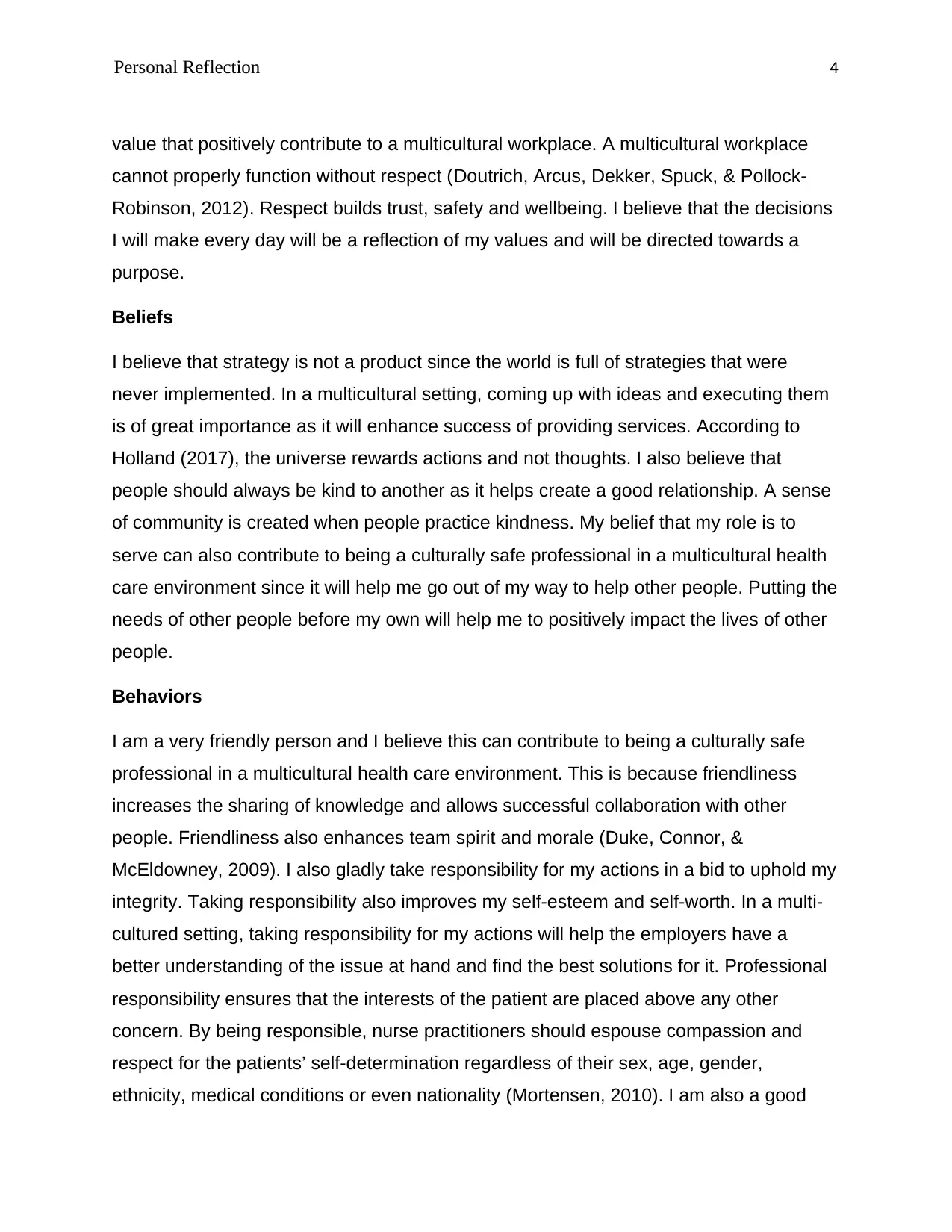
Personal Reflection 4
value that positively contribute to a multicultural workplace. A multicultural workplace
cannot properly function without respect (Doutrich, Arcus, Dekker, Spuck, & Pollock-
Robinson, 2012). Respect builds trust, safety and wellbeing. I believe that the decisions
I will make every day will be a reflection of my values and will be directed towards a
purpose.
Beliefs
I believe that strategy is not a product since the world is full of strategies that were
never implemented. In a multicultural setting, coming up with ideas and executing them
is of great importance as it will enhance success of providing services. According to
Holland (2017), the universe rewards actions and not thoughts. I also believe that
people should always be kind to another as it helps create a good relationship. A sense
of community is created when people practice kindness. My belief that my role is to
serve can also contribute to being a culturally safe professional in a multicultural health
care environment since it will help me go out of my way to help other people. Putting the
needs of other people before my own will help me to positively impact the lives of other
people.
Behaviors
I am a very friendly person and I believe this can contribute to being a culturally safe
professional in a multicultural health care environment. This is because friendliness
increases the sharing of knowledge and allows successful collaboration with other
people. Friendliness also enhances team spirit and morale (Duke, Connor, &
McEldowney, 2009). I also gladly take responsibility for my actions in a bid to uphold my
integrity. Taking responsibility also improves my self-esteem and self-worth. In a multi-
cultured setting, taking responsibility for my actions will help the employers have a
better understanding of the issue at hand and find the best solutions for it. Professional
responsibility ensures that the interests of the patient are placed above any other
concern. By being responsible, nurse practitioners should espouse compassion and
respect for the patients’ self-determination regardless of their sex, age, gender,
ethnicity, medical conditions or even nationality (Mortensen, 2010). I am also a good
value that positively contribute to a multicultural workplace. A multicultural workplace
cannot properly function without respect (Doutrich, Arcus, Dekker, Spuck, & Pollock-
Robinson, 2012). Respect builds trust, safety and wellbeing. I believe that the decisions
I will make every day will be a reflection of my values and will be directed towards a
purpose.
Beliefs
I believe that strategy is not a product since the world is full of strategies that were
never implemented. In a multicultural setting, coming up with ideas and executing them
is of great importance as it will enhance success of providing services. According to
Holland (2017), the universe rewards actions and not thoughts. I also believe that
people should always be kind to another as it helps create a good relationship. A sense
of community is created when people practice kindness. My belief that my role is to
serve can also contribute to being a culturally safe professional in a multicultural health
care environment since it will help me go out of my way to help other people. Putting the
needs of other people before my own will help me to positively impact the lives of other
people.
Behaviors
I am a very friendly person and I believe this can contribute to being a culturally safe
professional in a multicultural health care environment. This is because friendliness
increases the sharing of knowledge and allows successful collaboration with other
people. Friendliness also enhances team spirit and morale (Duke, Connor, &
McEldowney, 2009). I also gladly take responsibility for my actions in a bid to uphold my
integrity. Taking responsibility also improves my self-esteem and self-worth. In a multi-
cultured setting, taking responsibility for my actions will help the employers have a
better understanding of the issue at hand and find the best solutions for it. Professional
responsibility ensures that the interests of the patient are placed above any other
concern. By being responsible, nurse practitioners should espouse compassion and
respect for the patients’ self-determination regardless of their sex, age, gender,
ethnicity, medical conditions or even nationality (Mortensen, 2010). I am also a good
Secure Best Marks with AI Grader
Need help grading? Try our AI Grader for instant feedback on your assignments.
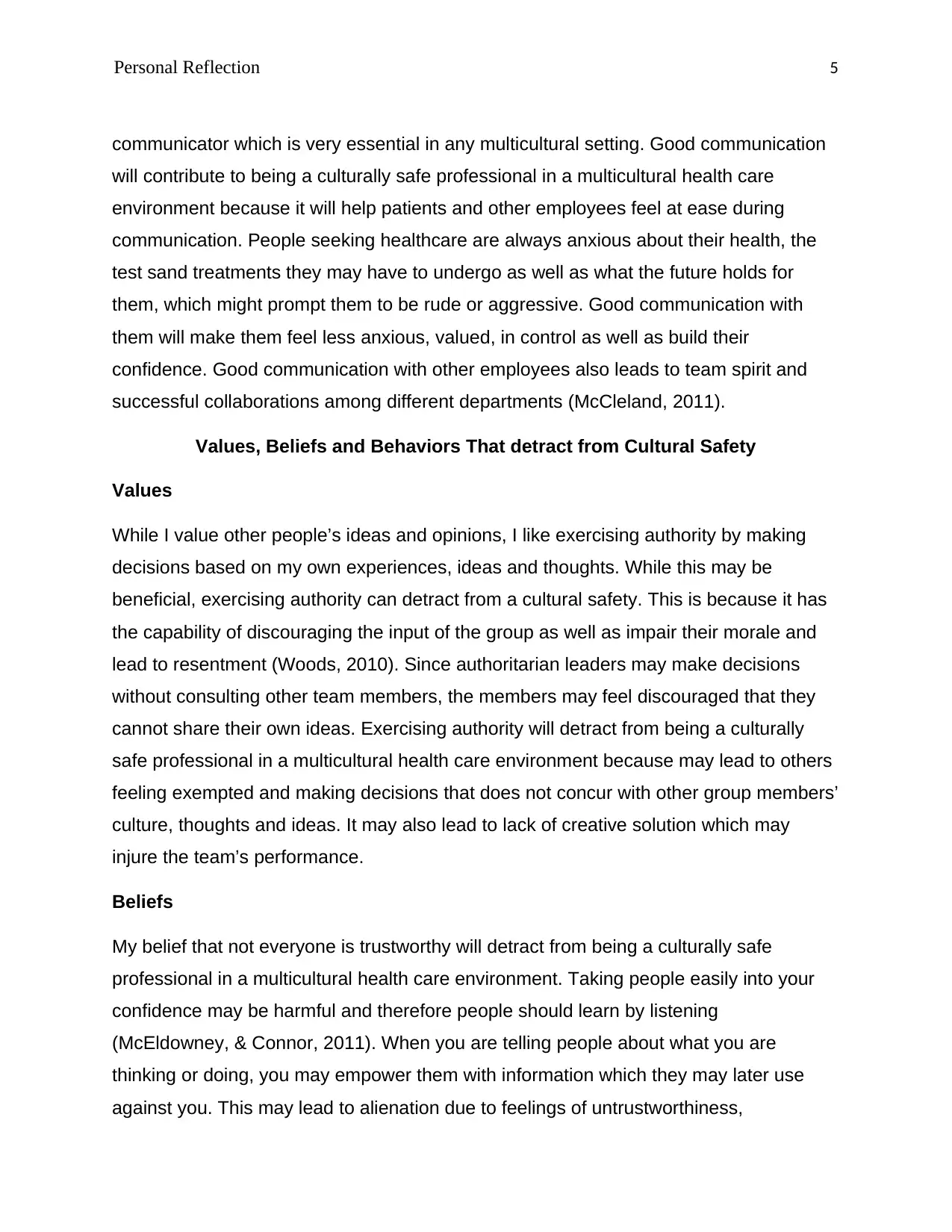
Personal Reflection 5
communicator which is very essential in any multicultural setting. Good communication
will contribute to being a culturally safe professional in a multicultural health care
environment because it will help patients and other employees feel at ease during
communication. People seeking healthcare are always anxious about their health, the
test sand treatments they may have to undergo as well as what the future holds for
them, which might prompt them to be rude or aggressive. Good communication with
them will make them feel less anxious, valued, in control as well as build their
confidence. Good communication with other employees also leads to team spirit and
successful collaborations among different departments (McCleland, 2011).
Values, Beliefs and Behaviors That detract from Cultural Safety
Values
While I value other people’s ideas and opinions, I like exercising authority by making
decisions based on my own experiences, ideas and thoughts. While this may be
beneficial, exercising authority can detract from a cultural safety. This is because it has
the capability of discouraging the input of the group as well as impair their morale and
lead to resentment (Woods, 2010). Since authoritarian leaders may make decisions
without consulting other team members, the members may feel discouraged that they
cannot share their own ideas. Exercising authority will detract from being a culturally
safe professional in a multicultural health care environment because may lead to others
feeling exempted and making decisions that does not concur with other group members’
culture, thoughts and ideas. It may also lead to lack of creative solution which may
injure the team’s performance.
Beliefs
My belief that not everyone is trustworthy will detract from being a culturally safe
professional in a multicultural health care environment. Taking people easily into your
confidence may be harmful and therefore people should learn by listening
(McEldowney, & Connor, 2011). When you are telling people about what you are
thinking or doing, you may empower them with information which they may later use
against you. This may lead to alienation due to feelings of untrustworthiness,
communicator which is very essential in any multicultural setting. Good communication
will contribute to being a culturally safe professional in a multicultural health care
environment because it will help patients and other employees feel at ease during
communication. People seeking healthcare are always anxious about their health, the
test sand treatments they may have to undergo as well as what the future holds for
them, which might prompt them to be rude or aggressive. Good communication with
them will make them feel less anxious, valued, in control as well as build their
confidence. Good communication with other employees also leads to team spirit and
successful collaborations among different departments (McCleland, 2011).
Values, Beliefs and Behaviors That detract from Cultural Safety
Values
While I value other people’s ideas and opinions, I like exercising authority by making
decisions based on my own experiences, ideas and thoughts. While this may be
beneficial, exercising authority can detract from a cultural safety. This is because it has
the capability of discouraging the input of the group as well as impair their morale and
lead to resentment (Woods, 2010). Since authoritarian leaders may make decisions
without consulting other team members, the members may feel discouraged that they
cannot share their own ideas. Exercising authority will detract from being a culturally
safe professional in a multicultural health care environment because may lead to others
feeling exempted and making decisions that does not concur with other group members’
culture, thoughts and ideas. It may also lead to lack of creative solution which may
injure the team’s performance.
Beliefs
My belief that not everyone is trustworthy will detract from being a culturally safe
professional in a multicultural health care environment. Taking people easily into your
confidence may be harmful and therefore people should learn by listening
(McEldowney, & Connor, 2011). When you are telling people about what you are
thinking or doing, you may empower them with information which they may later use
against you. This may lead to alienation due to feelings of untrustworthiness,
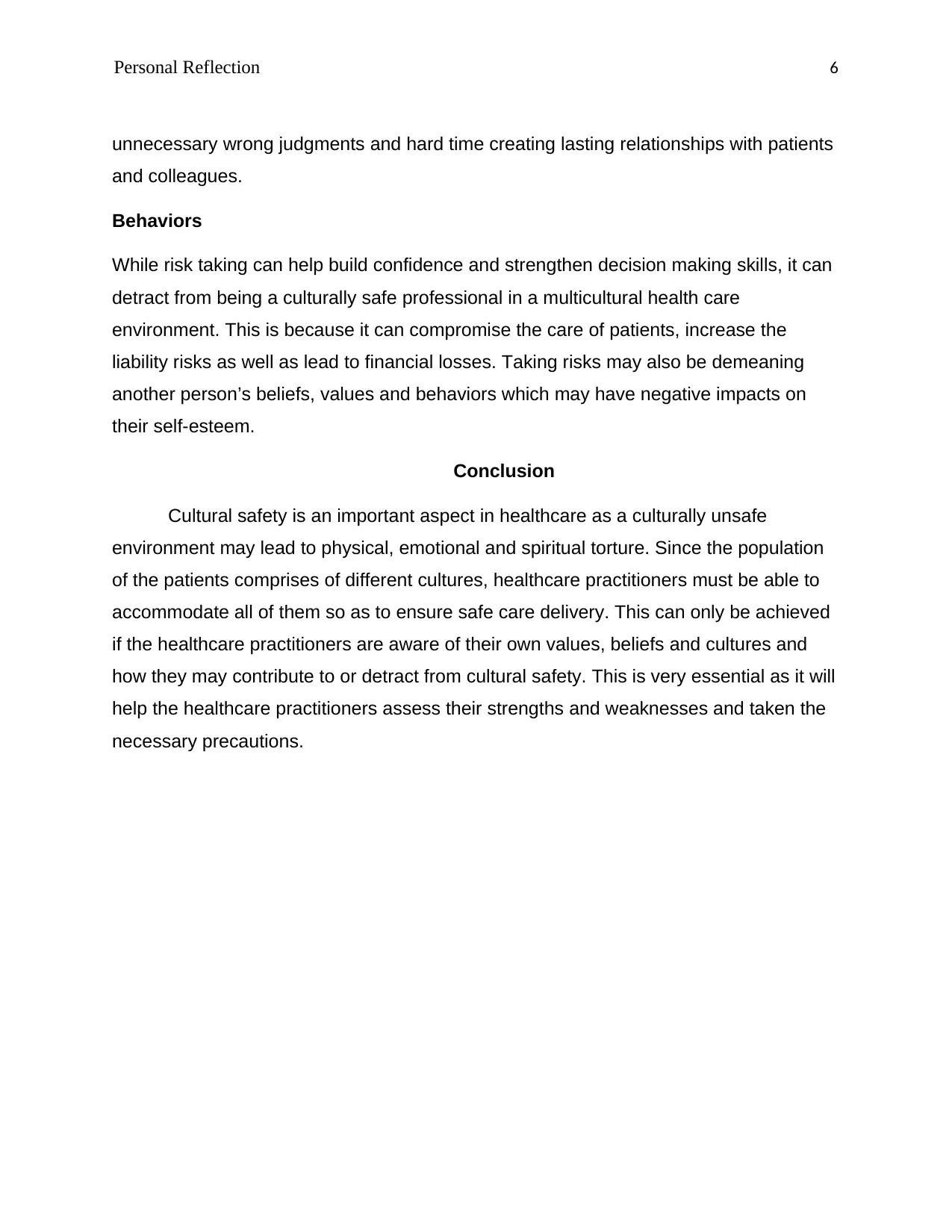
Personal Reflection 6
unnecessary wrong judgments and hard time creating lasting relationships with patients
and colleagues.
Behaviors
While risk taking can help build confidence and strengthen decision making skills, it can
detract from being a culturally safe professional in a multicultural health care
environment. This is because it can compromise the care of patients, increase the
liability risks as well as lead to financial losses. Taking risks may also be demeaning
another person’s beliefs, values and behaviors which may have negative impacts on
their self-esteem.
Conclusion
Cultural safety is an important aspect in healthcare as a culturally unsafe
environment may lead to physical, emotional and spiritual torture. Since the population
of the patients comprises of different cultures, healthcare practitioners must be able to
accommodate all of them so as to ensure safe care delivery. This can only be achieved
if the healthcare practitioners are aware of their own values, beliefs and cultures and
how they may contribute to or detract from cultural safety. This is very essential as it will
help the healthcare practitioners assess their strengths and weaknesses and taken the
necessary precautions.
unnecessary wrong judgments and hard time creating lasting relationships with patients
and colleagues.
Behaviors
While risk taking can help build confidence and strengthen decision making skills, it can
detract from being a culturally safe professional in a multicultural health care
environment. This is because it can compromise the care of patients, increase the
liability risks as well as lead to financial losses. Taking risks may also be demeaning
another person’s beliefs, values and behaviors which may have negative impacts on
their self-esteem.
Conclusion
Cultural safety is an important aspect in healthcare as a culturally unsafe
environment may lead to physical, emotional and spiritual torture. Since the population
of the patients comprises of different cultures, healthcare practitioners must be able to
accommodate all of them so as to ensure safe care delivery. This can only be achieved
if the healthcare practitioners are aware of their own values, beliefs and cultures and
how they may contribute to or detract from cultural safety. This is very essential as it will
help the healthcare practitioners assess their strengths and weaknesses and taken the
necessary precautions.
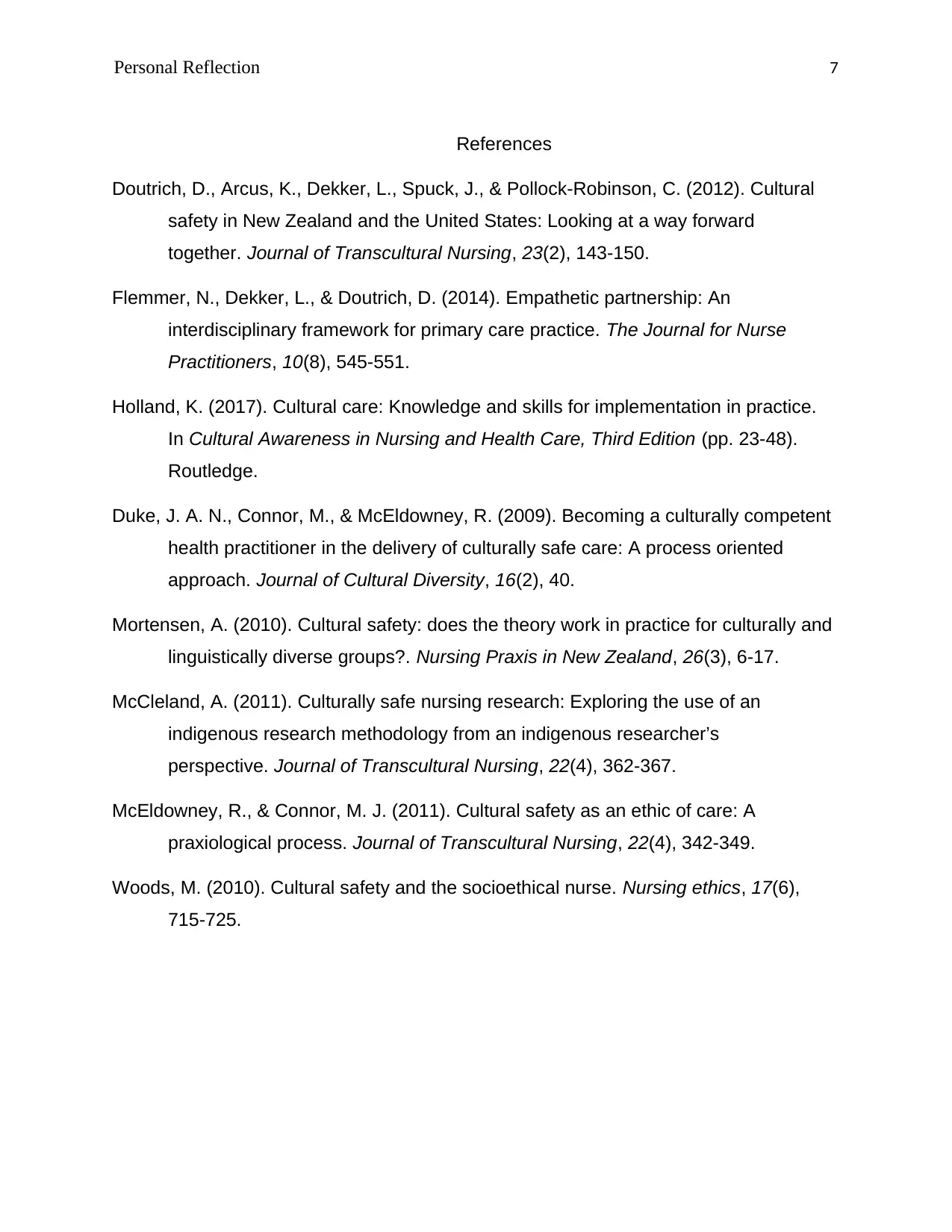
Personal Reflection 7
References
Doutrich, D., Arcus, K., Dekker, L., Spuck, J., & Pollock-Robinson, C. (2012). Cultural
safety in New Zealand and the United States: Looking at a way forward
together. Journal of Transcultural Nursing, 23(2), 143-150.
Flemmer, N., Dekker, L., & Doutrich, D. (2014). Empathetic partnership: An
interdisciplinary framework for primary care practice. The Journal for Nurse
Practitioners, 10(8), 545-551.
Holland, K. (2017). Cultural care: Knowledge and skills for implementation in practice.
In Cultural Awareness in Nursing and Health Care, Third Edition (pp. 23-48).
Routledge.
Duke, J. A. N., Connor, M., & McEldowney, R. (2009). Becoming a culturally competent
health practitioner in the delivery of culturally safe care: A process oriented
approach. Journal of Cultural Diversity, 16(2), 40.
Mortensen, A. (2010). Cultural safety: does the theory work in practice for culturally and
linguistically diverse groups?. Nursing Praxis in New Zealand, 26(3), 6-17.
McCleland, A. (2011). Culturally safe nursing research: Exploring the use of an
indigenous research methodology from an indigenous researcher’s
perspective. Journal of Transcultural Nursing, 22(4), 362-367.
McEldowney, R., & Connor, M. J. (2011). Cultural safety as an ethic of care: A
praxiological process. Journal of Transcultural Nursing, 22(4), 342-349.
Woods, M. (2010). Cultural safety and the socioethical nurse. Nursing ethics, 17(6),
715-725.
References
Doutrich, D., Arcus, K., Dekker, L., Spuck, J., & Pollock-Robinson, C. (2012). Cultural
safety in New Zealand and the United States: Looking at a way forward
together. Journal of Transcultural Nursing, 23(2), 143-150.
Flemmer, N., Dekker, L., & Doutrich, D. (2014). Empathetic partnership: An
interdisciplinary framework for primary care practice. The Journal for Nurse
Practitioners, 10(8), 545-551.
Holland, K. (2017). Cultural care: Knowledge and skills for implementation in practice.
In Cultural Awareness in Nursing and Health Care, Third Edition (pp. 23-48).
Routledge.
Duke, J. A. N., Connor, M., & McEldowney, R. (2009). Becoming a culturally competent
health practitioner in the delivery of culturally safe care: A process oriented
approach. Journal of Cultural Diversity, 16(2), 40.
Mortensen, A. (2010). Cultural safety: does the theory work in practice for culturally and
linguistically diverse groups?. Nursing Praxis in New Zealand, 26(3), 6-17.
McCleland, A. (2011). Culturally safe nursing research: Exploring the use of an
indigenous research methodology from an indigenous researcher’s
perspective. Journal of Transcultural Nursing, 22(4), 362-367.
McEldowney, R., & Connor, M. J. (2011). Cultural safety as an ethic of care: A
praxiological process. Journal of Transcultural Nursing, 22(4), 342-349.
Woods, M. (2010). Cultural safety and the socioethical nurse. Nursing ethics, 17(6),
715-725.
1 out of 7
Related Documents
Your All-in-One AI-Powered Toolkit for Academic Success.
+13062052269
info@desklib.com
Available 24*7 on WhatsApp / Email
![[object Object]](/_next/static/media/star-bottom.7253800d.svg)
Unlock your academic potential
© 2024 | Zucol Services PVT LTD | All rights reserved.





